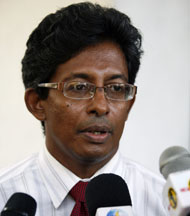New York, May 3, 2010—The Committee to Protect Journalists is heartened by news reports today that President Mahinda Rajapaksa has issued a pardon to Sri Lankan journalist J.S. Tissainayagam, left. CPJ is waiting for official clarification, however, concerning several important details.
The country’s recently appointed external affairs minister, G.L. Peiris, announced the pardon at a press conference in Colombo. “President Mahinda Rajapaksa has decided to pardon journalist J.S. Tissainayagam, who was convicted on 31 August 2009 under the Prevention of Terrorism Act,” Peiris told reporters. He noted that the announcement was timed to coincide with World Press Freedom Day, May 3.
“CPJ is waiting for a detailed explanation of the terms of the government’s announcement. We remain concerned about our colleague’s safety while he lives in seclusion in Sri Lanka,” said Bob Dietz, CPJ’s Asia program coordinator. “While this is potentially very good news, our enthusiasm is muted until the details are made clear.”
Tissainayagam’s attorneys were not notified of the pardon prior to the announcement, leaving several questions about the official details. Among its concerns, CPJ said, is whether the pardon will allow Tissainayagam freedom to travel within and outside of the country and whether the government will return the journalist’s passport. CPJ is also concerned that Tissainayagam be able to live and work without fear of reprisal. Unpunished violence against journalists is very high in Sri Lanka, CPJ research shows.
Tissainayagam was released on bail in January and has lived in seclusion since. At the time, CPJ welcomed Tissainayagam’s release from a sentence of 20 years, but called on Rajapaksa to extend a full pardon.
Based on its research, CPJ has concluded that Tissainayagam was imprisoned in retaliation for his critical journalism. CPJ named Tissainayagam a recipient of an International Press Freedom Award in 2009.
The Tamil editor was first jailed in March 2008 and eventually indicted under the Prevention of Terrorism Act in August 2008. The government said today that it would relax some restrictions put in place under a state of emergency first declared in August 2005. There was no mention of easing the Prevention of Terrorism Act, however.
